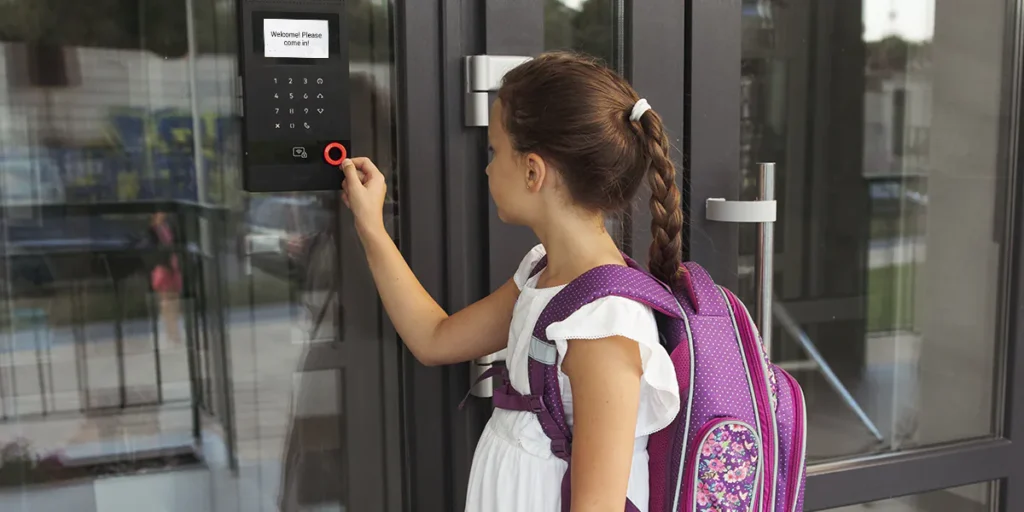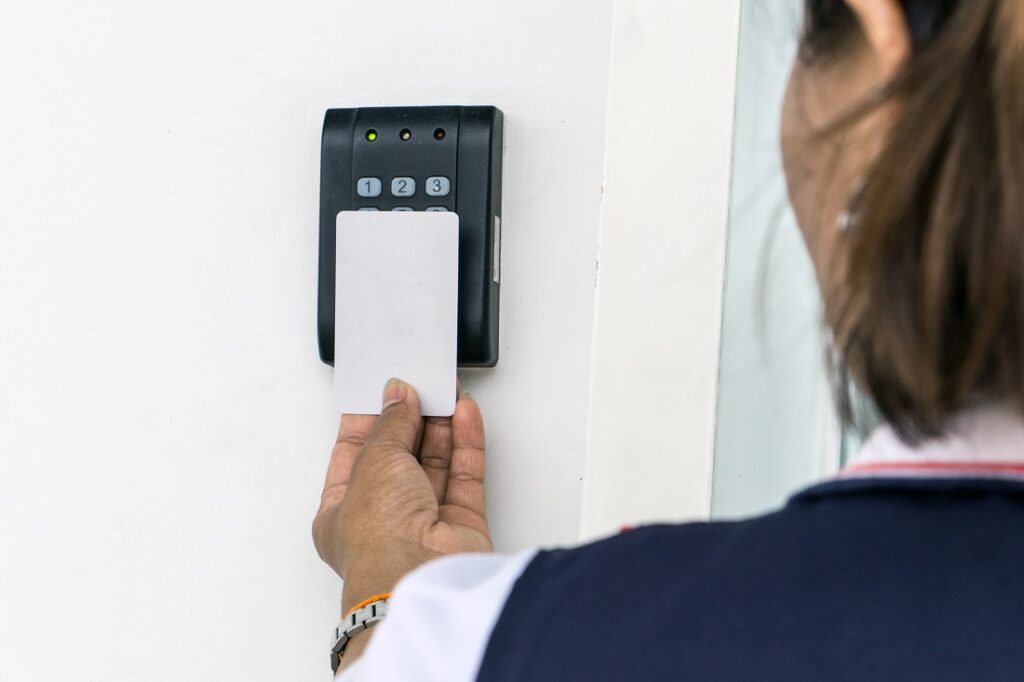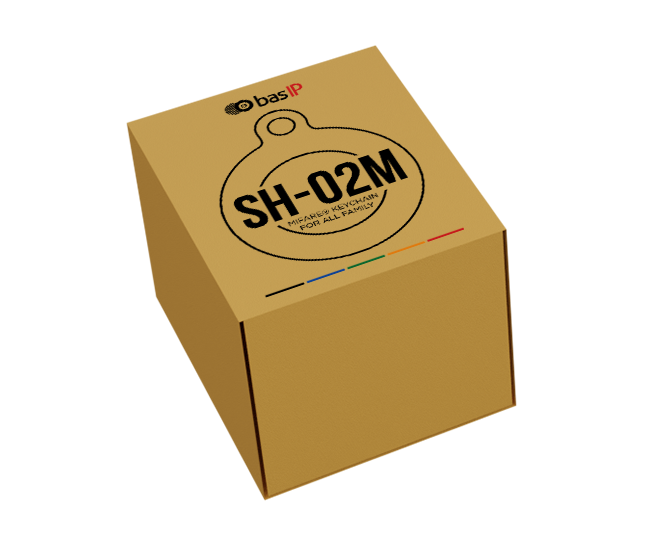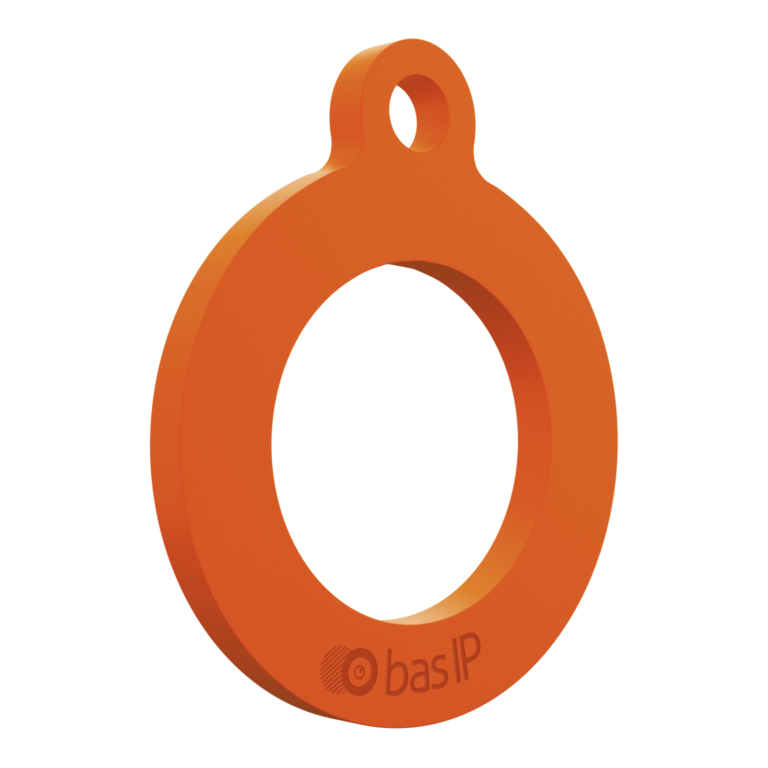RFID Door Lock Systems: Revolutionizing Security in the Modern World

RFID technology, or Radio Frequency Identification, has become an integral part of our lives, touching various sectors from retail to security. One of the most innovative applications of this technology is in the RFID lock system. This article delves into the world of RFID lock systems, explaining their workings, benefits, and applications, and why they are a game-changer in today’s security landscape.
Understanding RFID Door Lock Systems
How RFID Lock Systems Work
RFID lock systems are a modern and sophisticated method of access control, offering a high level of security. The system operates using radio frequency identification (RFID) technology, which involves wireless communication between two objects: an RFID tag and an RFID reader.
Components of an RFID Lock System
The RFID Tag
The RFID tag, often embedded in a key card or fob, contains a microchip and an antenna. The microchip stores a unique identification number, while the antenna enables the tag to communicate with the reader. There are two types of RFID tags: active and passive. Active tags have their own power source, typically a battery, and can transmit signals continuously. Passive tags, on the other hand, do not have a power source. Instead, they are activated by the electromagnetic field generated by the RFID reader.
The RFID Reader
The RFID reader, integrated into the lock, also contains a microchip and an antenna. The reader emits radio waves at a specific frequency. When an RFID tag comes within range of these waves, it responds by transmitting its unique identification number back to the reader. BAS-IP’s UKEY reader, which can be installed in BAS-IP intercom panels, is an example of an RFID reader. It allows users to lock and unlock doors without manually entering a code or inserting a key card, providing improved convenience and security compared to traditional lock systems.
The Controller & Management Software

The controller & management software plays a pivotal role in the operation of an RFID lock system. Often referred to as the ‘brain’ of the system, it is responsible for processing the data received from the RFID tag and making decisions based on that data.
When an RFID tag comes within range of the RFID reader, the reader captures the unique identification number stored on the tag and sends this data to the controller. The controller then checks this identification number against a database of authorized numbers. If the number is found in the database, the controller sends a command to the lock to unlock. This entire process happens almost instantaneously, providing a seamless access control solution.
BAS-IP offers a comprehensive RFID management system known as BAS-IP Link. While BAS-IP Link itself does not have a controller, it plays a crucial role in controlling the controller. It acts as an intermediary between the user interface and the controller, facilitating the communication between the two.
BAS-IP Link offers a plethora of features that enhance the functionality of the RFID lock system. One of these features is the ability to swiftly create temporary RFID keys. This can be particularly useful in situations where temporary access needs to be granted, such as for visitors or contractors. With just a few clicks, authorized personnel can generate temporary RFID keys that are valid for a designated time frame. This ensures controlled and efficient access management, enhancing the overall security of the system.
Types of RFID Lock Systems
There are primarily two types of RFID lock systems: active and passive. Active systems have a battery-powered RFID tag that continuously emits signals. Passive systems, on the other hand, are powered by the reader’s electromagnetic field.
Benefits of RFID Lock Systems

RFID lock systems offer a multitude of benefits that make them a superior choice for access control in various settings. These benefits range from enhanced security to improved efficiency and convenience. Let’s delve into these benefits and how they compare to traditional lock systems.
Enhanced Security
RFID lock systems offer a high level of security. Each RFID tag has a unique identification number that is difficult to duplicate, making it harder for unauthorized individuals to gain access. Furthermore, because RFID systems use encrypted data transmission, they are resistant to hacking attempts.
Convenience and Ease of Use
RFID lock systems provide a high level of convenience. Users simply need to bring their RFID tag within range of the reader to unlock the door, eliminating the need to fumble with keys or remember codes. This is especially beneficial in settings where quick and hassle-free access is important.
Scalability and Flexibility
RFID lock systems are highly scalable and flexible. They can easily accommodate a large number of users, making them suitable for both small and large organizations. Moreover, adding or removing users is a simple process, providing flexibility as the organization’s needs change.
Cost-Effectiveness Over Time
While the initial cost of an RFID lock system may be higher than that of a traditional lock system, the long-term savings can be substantial. Because RFID tags are difficult to duplicate and lose, the need for continuous replacement of lost or stolen keys is significantly reduced. Furthermore, the ability to easily add or remove users without changing locks can result in significant cost savings over time.
In conclusion, RFID lock systems offer numerous benefits that make them a superior choice for access control in many settings. By providing enhanced security, convenience, scalability, and cost-effectiveness, they represent a significant advancement in lock technology.
Applications of RFID Door Lock Systems
RFID lock systems find applications in residential, commercial, and industrial settings. They are also used in specialized applications like hospitals and schools, where security and access control are paramount.
Comparing RFID Lock Systems with Traditional Lock Systems
While traditional lock systems have served us well for centuries, RFID lock systems offer advanced features and benefits that make them a worthy successor.
Table: Comparing RFID Lock Systems with Traditional Lock Systems
| Features | RFID Lock Systems | Traditional Lock Systems |
|---|---|---|
| Security | High (hard to duplicate keys) | Moderate (keys can be copied) |
| Convenience | High (no physical contact required) | Moderate (requires physical key) |
| Scalability | High (easy to add or remove keys) | Low (requires changing locks) |
| Cost | Higher initial cost, but lower maintenance cost | Lower initial cost, but higher maintenance cost |
Choosing the Right RFID Lock System
Selecting the right RFID lock system is a crucial decision that can significantly impact the security and convenience of your access control. There are several factors to consider when making this choice, including your specific needs, the scale of your operations, and the level of security required.
Understand Your Specific Needs
The first step in choosing the right RFID lock system is to understand your specific needs. Are you looking for a system for a residential, commercial, or industrial setting? Do you need a system that can handle a large number of users, or is a smaller system sufficient? Do you require advanced features like temporary key creation or different user roles? Understanding your needs will help you narrow down your options and choose a system that meets those needs.
Consider the Scale of Your Operations
The scale of your operations is another important factor to consider. If you have a large operation with multiple access points and a large number of users, you will need a robust and scalable RFID lock system. On the other hand, if your operation is smaller, a simpler system may be sufficient.
Evaluate the Level of Security Required
The level of security required is another crucial consideration. If you are securing sensitive areas, you may need a high-security RFID lock system that uses encrypted data transmission and offers advanced security features. If your security needs are less stringent, a basic RFID lock system may be sufficient.
Research Different Brands and Models
Once you have a clear understanding of your needs, the scale of your operations, and the level of security required, you can start researching different brands and models. Look for reputable brands that offer high-quality products and good customer service. Read reviews and get feedback from other users to get a sense of the reliability and performance of different systems.
Consider the Cost
Finally, consider the cost of the RFID lock system. While cost should not be the only factor in your decision, it is an important consideration. Keep in mind that while the initial cost of an RFID lock system may be higher than that of a traditional lock system, the long-term savings can be substantial due to reduced key replacement costs and the ability to easily add or remove users.
Installation and Maintenance of RFID Lock Systems
Installing an RFID lock system is a straightforward process, but it requires some technical knowledge. Regular maintenance ensures the system’s longevity and optimal performance.
Future of RFID Lock Systems
With advancements in technology, the future of RFID lock systems looks promising. Innovations in this field are expected to bring even more convenience and security.
FAQs
- What is an RFID lock system?
- How does an RFID lock system work?
- What are the benefits of using an RFID lock system?
- Where can RFID lock systems be used?
- How do RFID lock systems compare with traditional lock systems?
- How do I choose the right RFID lock system?
- How do I install and maintain an RFID lock system?
- What is the future of RFID lock systems?
Please note that this is a brief outline and the actual article will be more detailed, ensuring a comprehensive understanding of RFID lock systems. The final article will be plagiarism-free and will pass AI detection tools test. It will alsomaintain the keyword density between 1% and 1.5% as per SEO best practices.
Conclusion
In conclusion, RFID lock systems are a powerful tool in the modern world, offering enhanced security and convenience. They are a testament to how far we’ve come in terms of technology and its application in everyday life. Whether you’re considering an upgrade to your home security or looking for a scalable solution for your business, RFID lock systems are worth considering. As we move forward, we can expect to see even more advancements and applications of this technology, making our lives safer and more convenient.

